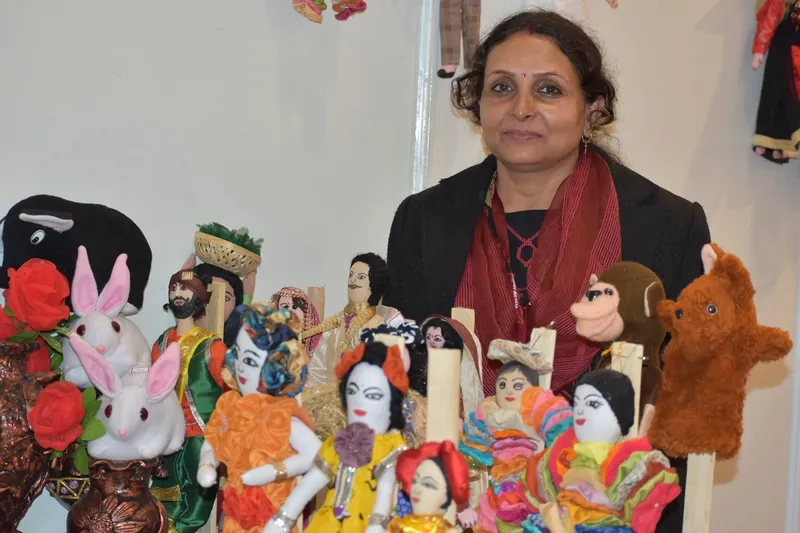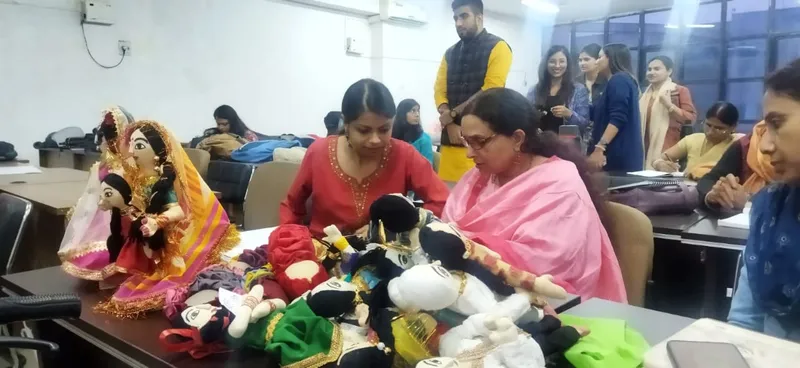Namita Azad is giving Bihar’s beautiful Kanyaputri doll tradition a new lease of life
The Kanyaputri doll, handcrafted by girls and women has been a rich tradition in Bihar’s Champaran districts. Ignored and lost due to the influx of plastic toys, these dolls are now being revived and popularised by Namita Azad, a teacher-entrepreneur.
Namita Azad spent her early childhood years in Manjhariya village in Bihar’s West Champaran district, where she learned a lovely tradition surrounding the Kanyaputri dolls.
Made from pieces of fabric scrap, these girl dolls made in every home in the Champaran districts also told an interesting story.
A tale of tradition
Azad, the founder of Patna-based Crafts ‘N’ Creations, can be singularly credited with reviving the Kanyaputri dolls and giving them global recognition. She recollects the tale she heard from her mother, aunts, and grandmothers about these dolls.

Namita Azad with the Kanyaputri dolls.
“Every little girl in the region made a Kanyaputri doll from fabric scrap by hand during the Saavan (monsoon) season. Sisters lovingly crafted these dolls for their brothers, and after they were made, the dolls were given a dip in the nearby pond. The brothers brought these dolls back to their sisters and this ritual was celebrated by sharing sweets. It embodied the love and the bond between brothers and sisters,” says Azad.
Also, these Kanyaputri dolls were part of every wedding trousseau and Azad remembers being awestruck seeing the different kinds of dolls her sister-in-law had brought along when she got married. Along these were also dolls depicting various animals, celebrating the co-existence of man and nature.
After spending a few years in the village, Azad kept moving to various districts in the state as her father, a government employee was frequently transferred. After completing an MA in Psychology, she also completed a master’s in Art and Craft from the Pracheen Kala Kendra in Chandigarh.
But the image of the Kanyaputri dolls remained in her mind even if the ritual was long forgotten and plastic toys had found their way into homes and marriage trousseaus, making them impersonal compared to their traditional counterparts.
Using dolls as a learning medium

Different kinds of kanyaputri dolls
While Azad working with an office of the Udyog Vibhag (Industries Department) in Patna, she was training teachers on how to use art as a medium to educate children on different subjects when life took a different course.
“I taught teachers on how to use art to understand and help students by using various psychological concepts. There was one chapter on family and it suddenly struck me that I could use dolls to explain this,” says Azad.
The idea of using Kanyaputri dolls as a medium struck her, and she began crafting dolls to use in the classroom. They were an instant hit because they were not only pretty to look at—but were also eco-friendly as everything was made by hand.
In 2013, her student Sunitha Prakash impressed her upon the need to take up this craft seriously and Azad left her job and started making Kanyaputri dolls full-time.
Initially, she trained two of her house-help to support her in her work. Azad started collecting fabric scrap from various tailoring places and fabric centres and made the dolls herself. She sent her first batch of 10 dolls to the Khadi Mall in Patna and they were sold out in two days.
Encouraged by this, she approached and received support from Upendra Maharathi Shilp Anusandhan Sansthan, NIFT Patna, Bihar Mahila Udyog Sangh, Mahila Women & Child Development Corporation, Bihar and Women School of Entrepreneurship, who wholeheartedly encouraged to carry this state tradition forward.
“Slowly, I began speaking to other women in my neighbourhood about the doll and its rich tradition. Some started by sorting out the scrap material, others learned to fill the doll’s body with cloth, and some sewed on buttons. Over time, they also learned to make the dolls and now, I have 15 women working with me,” says Azad.
Straying a bit away from the traditional “girl” dolls, the teacher-entrepreneur and her group of women handcrafts different types of dolls using the same concept – those made from katran or cloth scraps with 95% of the process made by hand.
Kanyaputri dolls now come as family dolls, dolls to depict nuclear families and joint families, and even mermaids. These dolls can also be used to convey social messages.
“We have made dolls to educate people on the importance of nutrition for pregnant women and children. Our dolls are used by schools to educate children as well,” she adds.
Every year, 10-12 students from NIFT Patna collaborate with Azad on a project on the Kanyaputri dolls. This association, she says, has helped her learn about new trends regarding fabric and concepts and has given the dolls a better finesse, too.
Important to raise awareness

Namita (in pink) teaching how to craft the Kanyaputri dolls
The Kanyaputri dolls are available for sale at the Bihar Museum, various state emporiums, the Dilli Haat, and are also sold through different fairs and exhibitions all over the country.
Azad also makes customised dolls if a customer asks for it. She also gets bulk orders from the Bihar Museum, and other government agencies and makes dolls for weddings and other occasions and festivals like Diwali where the doll is kept as part of the celebrations in most homes. The dolls cost anywhere between Rs 100 and Rs 5,000 depending on the work that goes into each, and the accessories.
Recently, Azad was honoured with the Bihar Handcraft State Award for her exceptional work in preserving and promoting Kanyaputri Dolls art in 2023. She also credits Ranjan Mistry, a Bihar-based entrepreneur who has been a strong pillar of support from the beginning, advising and supporting her in her business.
“There is a good market for the dolls and the business is very profitable. But scaling the business is taking time because I don’t want to compromise on the process of doll-making. I ensure that the women are trained well, and they start making the dolls only when I am convinced that they stay true to the concept and tradition,” she says.
She’s happy that dolls made from cloth have been included in the 14 craft forms under the Vishwakarma Kaushal Samman Yojana, a central government initiative that supports traditional artisans and craftspeople.
“To popularise the Kanyaputri dolls, we also need to raise awareness of this tradition. Even today, while my dolls are being made in Patna, there are very few women from my village interested in this. My plan is to conduct training camps there so that more women can understand that they can use the skills they learned from their mothers and grandmothers and also earn an income,” she signs off.
Edited by Affirunisa Kankudti







